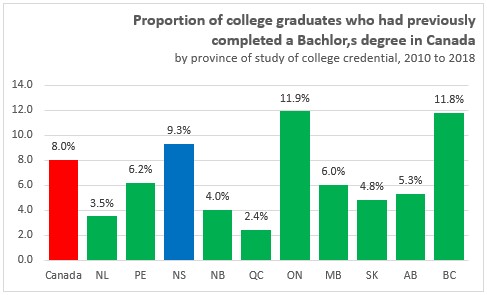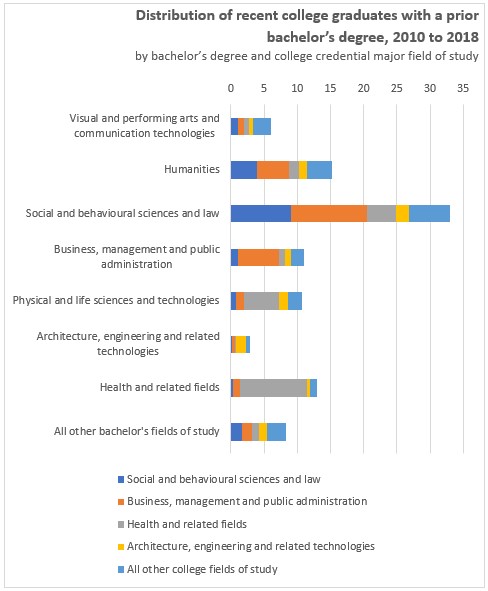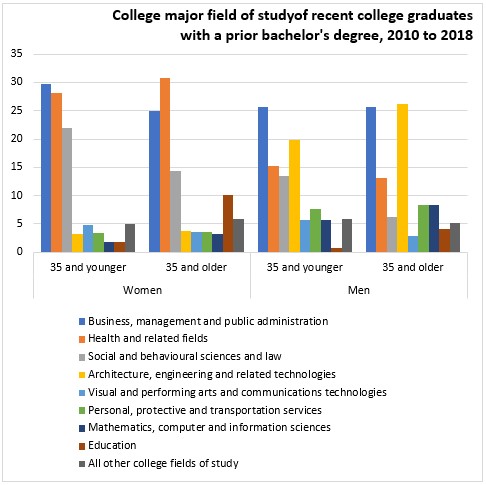The Economics and Statistics Division maintains archives of previous publications for accountability purposes, but makes no updates to keep these documents current with the latest data revisions from Statistics Canada. As a result, information in older documents may not be accurate. Please exercise caution when referring to older documents. For the latest information and historical data, please contact the individual listed to the right.
<--- Return to Archive
For additional information relating to this article, please contact:
April 14, 2021STUDY: COMPLETION OF A COLLEGE CERTIFICATE OR DIPLOMA AFTER A BACHELOR'S DEGREE Statistics Canada recently released a study on the Completion of a college certificate or diploma after a bachelor’s degree using data from the Postsecondary Student Information System and the 2016 Census of Population. The study looks at characteristics and outcomes of recent college graduates with a prior bachelor’s degree. The study shows that among recent graduates of Canadian college certificate or diploma programs, 8.0% had previously completed a bachelor’s degree at Canadian postsecondary institution, 1.0% completed a Canadian credential above the bachelor level and 5.0% completed a bachelor’s degree or higher abroad from 2010 to 2018. However, the study only looks at the Canadian bachelor’s degree holders.
Nationally, the proportion of college graduates who had prior Canadian bachelor’s degree was 8.0% with the highest proportion in Ontario (11.9%), British Columbia (11.8%) and Nova Scotia (9.3%). The lowest proportion of college graduates who had prior Canadian bachelor’s degree was in Quebec (2.4%).

The study noted that the most common college field of study among recent college graduates for those with a prior bachelor’s degree were business, management and public administration and health and related fields and social and behavioural sciences and law.
The most common college field of study for men among recent college graduates for those with a prior bachelor’s degree was business, management and public administration (25.8%) while the most common college field of study for men among recent college graduates for those without a prior bachelor’s degree was architecture, engineering and related technologies (42.0%).
The most common college field of study for women among recent college graduates for those with a prior bachelor’s degree were business, management and public administration (28.9%) and health and related fields (28.7%) while the most common college field of study for women among recent college graduates for those without a prior bachelor’s degree was health and related fields (32.3%).

The study presents the distribution of recent college graduates with a prior bachelor’s degree by bachelor’s degree and college credential major field of study. Major field of study of bachelor’s degree is presented on the vertical axis. The most common bachelor’s field of study among recent college graduates were social and behavioural sciences and law (33.0%) and humanities (15.0%). The findings of the study are consistent with previous literature.
The study noted that bachelor’s degree and college credentials field of study were often related with each other. For example, 78.0% of those whose bachelor’s degree was in health and related fields, and 50.0% of those whose bachelor’s degree was in physical and life sciences and technologies, studied health and related fields at college while 56.0% of those whose bachelor’s degree was in business, management and public administration studied business, management and public administration at college. There are some exceptions such as different bachelor’s degree holders studied childcare or paralegal programs at college level. The results suggest that college programs did not replace bachelor’s degree while enhanced labour market directed skills and both were complementary.

The study presents two age groups, younger (35 and younger) and older (35 and older) for men and women to show major field of study chosen by recent college graduates with a prior bachelor’s degree. The study noted that younger group among recent college graduates with a prior’s bachelor’s degree was 81.0% and older group was 19.0%. Younger graduates of both men and women was more likely to study social and behavioural sciences and law.
Older women graduates were more likely than their younger counterparts to study education at college including professional development for teachers, in teaching aid programs and teaching English as a second language. Older male graduates were more likely than their younger counterparts to study architecture, engineering and related technologies at college and 7 percentage points more likely to study trades.
Younger graduates of both men and women were more likely to study various programs related to their bachelor’s degree. Older graduates of both men and women were more likely to study programs that replaced to their bachelor’s degree. The programs may be directed towards career change or re-enter the labour market.

The findings of the study suggested that the bachelor’s degree and college credential fields studied by recent college graduates with a prior bachelor’s degree were related to each other, and both fields were related to their occupations. This relationship was stronger among the college credential field and the occupation as business and finance professions were generally the most common occupation among those who studied business at college, for a variety of bachelor’s degree fields.
Statistics Canada: Study: Completion of a college certificate or diploma after a bachelor's degree
<--- Return to Archive